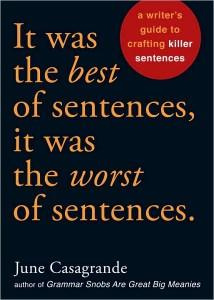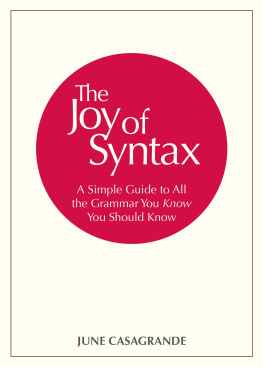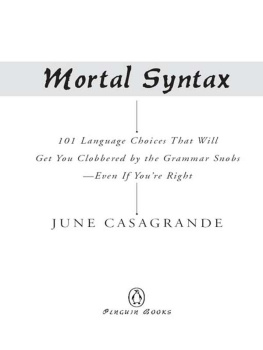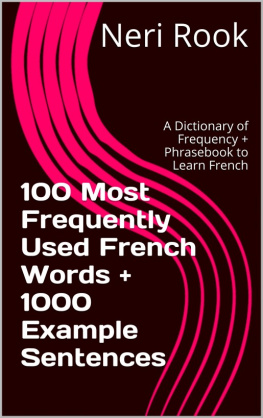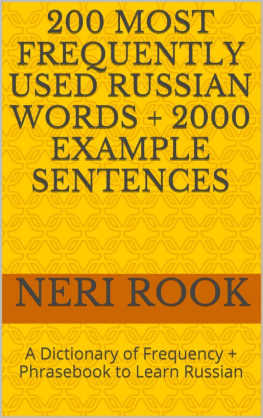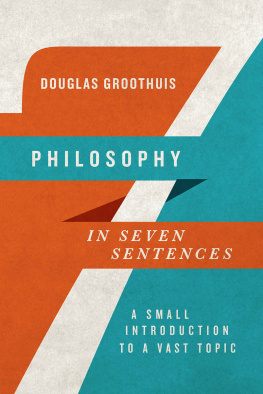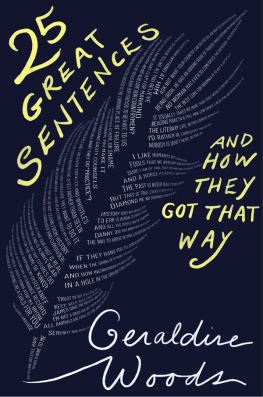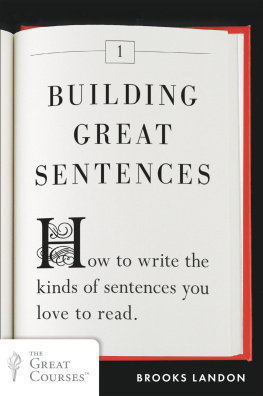June Casagrande - It was the best of Sentences, it was the worst of sentences.
Here you can read online June Casagrande - It was the best of Sentences, it was the worst of sentences. full text of the book (entire story) in english for free. Download pdf and epub, get meaning, cover and reviews about this ebook. year: 2011, genre: Science. Description of the work, (preface) as well as reviews are available. Best literature library LitArk.com created for fans of good reading and offers a wide selection of genres:
Romance novel
Science fiction
Adventure
Detective
Science
History
Home and family
Prose
Art
Politics
Computer
Non-fiction
Religion
Business
Children
Humor
Choose a favorite category and find really read worthwhile books. Enjoy immersion in the world of imagination, feel the emotions of the characters or learn something new for yourself, make an fascinating discovery.
- Book:It was the best of Sentences, it was the worst of sentences.
- Author:
- Genre:
- Year:2011
- Rating:4 / 5
- Favourites:Add to favourites
- Your mark:
- 80
- 1
- 2
- 3
- 4
- 5
It was the best of Sentences, it was the worst of sentences.: summary, description and annotation
We offer to read an annotation, description, summary or preface (depends on what the author of the book "It was the best of Sentences, it was the worst of sentences." wrote himself). If you haven't found the necessary information about the book — write in the comments, we will try to find it.
It was the best of Sentences, it was the worst of sentences. — read online for free the complete book (whole text) full work
Below is the text of the book, divided by pages. System saving the place of the last page read, allows you to conveniently read the book "It was the best of Sentences, it was the worst of sentences." online for free, without having to search again every time where you left off. Put a bookmark, and you can go to the page where you finished reading at any time.
Font size:
Interval:
Bookmark:







This sentence rocks. It's concise. It's powerful. It knows what it wants to say, and it says it in clear, bold terms.
But upon quickly or slowly reading a sentence such as this, in which the writer quite clearly is wanting to make a point regarding various issues pertaining to general written communication, it suddenly becomes more than clear that this is a sentence whose aspirations of rocking have been handily eclipsed in favor of the act of sucking.
We all know bad writing when we see it. Yet recognizing it and understanding it are two very different things. It seems we never take the time to sit down and ask ourselves what exactly makes a sentence like the one in the previous paragraph so terrible. Yes, it's too long. Yes, it's stuffy. But those issues alone don't capture the breadth and depth of its lameness. The problems with this sentence run much deeper. Understanding the issues that plague itthat plague all our writingrequires thought, time, a grounding in grammar, and the energy to stop and look at the writer's guiding question: what am I really trying to say?
On the rare occasions when we endeavor to understand the difference between good and bad sentences, we can find ourselves lost. Surely good sentences have something to do with all that grammar stuff we were supposed to learn in schoolthe stuff that somehow escaped us and, as a result, has caused us great shame ever since. We remember a teacher saying something about dangling participles. We have vague memories of someone lecturing about active versus passive voice. We know all this business has something to do with subjects and modifiers. But we don't remember the details. So instead of helping us, these terms taunt us. They linger in the back of our minds, making us feel as if good writing is completely beyond our grasp. So we go on writing badly.
We write bad memos, bad term papers, bad novels, bad cover letters, bad query letters, bad advertising copy, bad e-mails, bad book proposals, bad blog entries, bad grant proposals, and bad technical manuals. We crumble under the weight of our own information, at a loss to convey it to the reader in a way that makes sense. We have so much to say. On many levels, we know we're good writers. Maybe even really good. Yet we just can't form our good information into readable, engaging, comprehensible sentences.
Ironically, most of us are perfectly adept at putting our thoughts and experiences into wordsas long as those words ate coming out of our mouths and not through our keyboards or pens. No one ever shows up at the office on Monday morning and says of Saturday night's Green Day concert, "Before considering whether to madly rush the stage, charging in the direction of an area rapidly transforming itself and its denizens into what could only be described as a rollicking mosh pit, I purchased and thirstily consumed a cola beverage."
No, it's the act of putting it on paperforming ideas into sentencesthat trips us up. That's true partly because some of us are conditioned to fear writing. Unlike when we speak, we usually spend time thinking about what we want to say before we write, so we have more time to worry about it and thus overcomplicate it. What's more, when we write we often have in our heads more information than we can use, and we don't know what to leave out.
But perhaps the biggest reason that our sentences go bad is that, when we sit down to write, someone is missing. Unlike those bull sessions around the watercooler in which we so adeptly tell stories of concerts and cola consumption, when we write we're all alone. The rapt co-workers looking us in the eye and hanging on every word are nowhere to be found. In their place is a shadow of a someone we may have never met and we'd just as soon not think aboutsomeone called the Reader.
Thy Reader, Thy God
If you want to master the art of the sentence, you must first accept a somewhat unpleasant truthsomething a lot of writers would rather deny: The Reader is king. You are his servant. You serve the Reader information. You serve the Reader entertainment. You serve the Reader details of your company's recent merger or details of your experiences in drug rehab. In each case, as a writer you're working for the man (or the woman). Only by knowing your place can you do your job well. You have a bossa fickle, exacting, surprisingly slick oneand you can't ignore him just because he isn't physically reading over your shoulder. Good writing hangs in the balance.
Here's another way to think of this: Your writing is not about you. It's about the Reader. Even when it's quite literally about youin memoirs, personal essays, first-person accountsit's not really about you.
Ever read a memoir that sounded too self-pitying? Ever read an op-ed that sounded too preachy or self-important? Ever read a memo that sounded smothered in jargon or unnecessary details? Ever read a blog entry that talked about people you've never met as if you'd known them all your life? Those things happened because the writer forgot her place. She forgot that she was working for you and not the other way around. She was unwittingly attempting to get you to work for her. She was trying to get your pity or evoke your shock for her own purposes. She was trying to tell you what to think instead of giving you information from which you could draw your own conclusions. She was focused on the details of her own situation without asking herself which details were relevant to yours.
Readers don't read memoirs because Frank McCourt needs pity or because Jeannette Walls needs you to know that her parents were unstable or because Mary Karr wants to get some stuff off her chest. In each of these memoirists' amazing stories, the Reader finds not just entertainment but themes that touch on his own lifethemes of hope, perseverance, suffering, and the power to overcome.
When you forget the Reader, you get what I call writer-serving writing. It exists at every level of writing expertise. I've gagged on it when reading personal essays and caught whiffs of it in award-winning books and articles. I've been horrified to notice it in my own writing. Writer-serving writing is perfectly appropriate in diaries and journalsbut any writing that's meant to be seen by a Reader must serve the Reader. If you like, we can make an exception for diary-like blogs in which the Reader is like a voyeur. But that's the exception. This is the rule: whether you're Christian, Jew, Muslim, or a disciple of the church of Penn Jillette, when you sit down to write, the Reader is thy god.
True, you can't know everything the Reader wants. You can't serve all the Readers all the time. And you shouldn't try. But there is one thing all Readers want: clear, concise, comprehensible sentences that mean something to them.
Font size:
Interval:
Bookmark:
Similar books «It was the best of Sentences, it was the worst of sentences.»
Look at similar books to It was the best of Sentences, it was the worst of sentences.. We have selected literature similar in name and meaning in the hope of providing readers with more options to find new, interesting, not yet read works.
Discussion, reviews of the book It was the best of Sentences, it was the worst of sentences. and just readers' own opinions. Leave your comments, write what you think about the work, its meaning or the main characters. Specify what exactly you liked and what you didn't like, and why you think so.

